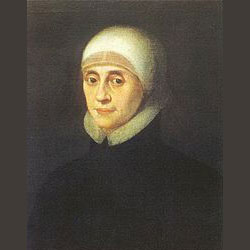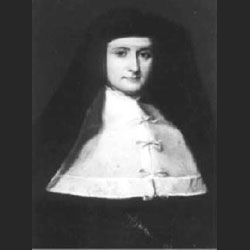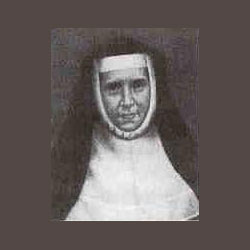
Mary Ward
Mary Ward was born on January 23 1585, in Elizabethan England, at a time of great religious intolerance. She was a victim of the persecution of Catholics. The Women of great faith that she was , she saw the need for a sound religious education for young Women who would assume responsibilities in society and in the church, for, as she said,'Women in time to come will do much'. Inspired at the tender age of 15 to renounce the world, she decided to dedicate her life to God, having refused many proposals of marriage.
In 1609, she left her homeland and with a small group of companions, she opened a school at St. Omer, Flanders where girls were taught reading, writing, and sewing, as well as the principle of Christian life.
She had a passionate love for Integrity, Justice and Freedom and she consistently endeavoured to live out these qualities. The new type of consecrated life which she began- frees from enclosure, without religious habit and ruled by a woman-received much opposition. The vision of woman's role in the church was unacceptable and suspect, and in 1631, Mary Ward's Institute was suppressed and she herself was imprisoned as a heretic for a time.
Mary Ward described as 'A woman beyond compare' died at York on January 30th, 1645. "Unless the grain of wheat falls into the ground and dies, it remains alone" (Jn 12, 24). The serenity and confidence with which she accepted all kinds of sufferings, not the least physical ones, her fidelity to the church despite multiple tribulations, made of her the " grain of wheat" sown by God which, after the rebirth of her Institute, would bear fruit in all continents down to the present day.
There are Loreto schools in 12 countries on 5 continents.

Teresa Ball
Frances Ball was born in lreland in 1794, and educated at St. Mary's Convent, a boarding school conducted by the members of the Institute of the Blessed Virgin Mary, in York, England.
She heard the unmistakable call of God "Seek first the Kingdom of God and His Justice and all these things will be added unto you." At the age of twenty, Frances returned to York to enter the novitiate, preparing herself for the foundation of the Institute of the Blessed Virgin Mary in Ireland, and made her profession as Mother Teresa.
In 1821 Teresa Ball established the first House of the Institute in Ireland and called it Loreto, the name by which all the subsequent foundations made from Ireland are still known.

Delphine Hart
Loreto in India owes its origin to a visit by Dr. Bakhaus to Loreto Abbey, Ireland, in 1840 to request Mother Teresa Ball to send Sisters to set up a school for Catholic children in Calcutta.
In 1841, Mother Teresa sent 7 Loreto Sister and 5 Postulants, all in their twenties, to India, under the Leadership of Delphine Hart announcing that they would probably never see their homeland again. They were welcome to Calcutta by Bishop Carew, and installed at Loreto House, 7 Middleton Row. They were the first congregation to come to North India.